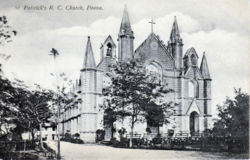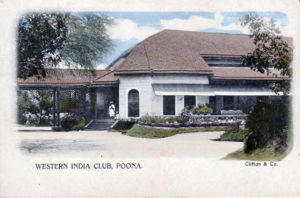Poona: Difference between revisions
add image |
Nick Adams (talk | contribs) No edit summary |
||
| Line 21: | Line 21: | ||
Variants: Poona<br> | Variants: Poona<br> | ||
[[Image:Western India Club Poona.jpg|300px|thumb|Western India Club, Poona]] | [[Image:Western India Club Poona.jpg|300px|thumb|Western India Club, Poona]] | ||
==Education== | |||
'''Further education''' | |||
Poona Sanskrit College 1837 reopened and offered a combined Sanskrit and medicine course – under Superintendant: Captain Candy. | |||
Sanskrit and Vernaculars College opens 1851/52 from the amalgamation of Poona’s English and Venacular schools later to be come the Deccan Arts College 1857, with affiliation to Bombay University 1860. | |||
Engineering College founded 1865 affiliated to Bombay University (its creation is contemporary with the construction of the Great Indian Peninsular Railway) later known as the College for Science 1880. It was created to provide staff for the Public Works Department. Courses were offered in:n Civil Engineering, Agriculture, Forestry, plus apprentice training. | |||
1826 Government schools opened (teaching vernacular) under control of Mr Jervis, increasing to 3 schools by 1847 | |||
Government Schools 1883 Poona town | |||
• High School 1 | |||
• Anglo vernacular 2 | |||
• Vernacular 18 | |||
• Training schools 2 (teacher training: one male est: 1857, one female est: 1870) | |||
Private schools 45 | |||
'''Private schools''' | |||
Bishops High School, est1864 | |||
St Vincent Roman Catholic High School est 1867 includes anglo-indian section | |||
Free Church Mission Institute est 1866 | |||
Poona Native Institution est 1866 | |||
The Pensions Middle Class School for boys and girls est 1864 | |||
The Conference Middle Class School est 1879 | |||
The Mission Orphanage and Christian Boys Middle Class School est 1879 | |||
The Victoria Girls High School est 1876 | |||
St Mary’s Girls High School est 1867 | |||
The Convent High School for Girls est 1860 | |||
The Scottish Girls High School est 1882 | |||
St Anne’s Middle Class School for Girls est1873 | |||
The Zanana Mission Anglo-Vernacular School for Girls est 1882 in Sukravar Peth, Sadasiv Peth, Civil Lines and Kamathipura | |||
The Free Church Mission School for Boys est 1876 in Aditvar Peth. | |||
The Mission Orphanage Panch Haud Vernacular School est 1882 | |||
The Free Church Mission School for Girls est 1850 in the camp. | |||
The Free Church Mission for Girls Vernacular School est 1882 in Aditvar Peth. | |||
The Bene-Israel Girls Vernacular School in Rastya Peth est 1882 | |||
The New English School est 1880 | |||
== External links == | == External links == | ||
===Historical Books Online=== | ===Historical Books Online=== | ||
Revision as of 04:35, 6 June 2010
| Poona | |
|---|---|

| |
| Presidency: Bombay | |
| Coordinates: | 18.520469°N, 73.85662°E |
| Altitude: | 560 m (1,837 ft) |
| Present Day Details | |
| Place Name: | Pune |
| State/Province: | Maharashtra |
| Country: | India |
| Transport links | |
| Great Indian Peninsula Railway Southern Mahratta Railway | |
Poona is a city about 100km south-east of Bombay (now Mumbai), which was formerly a garrison town of the British Army. In recent times it has been famous for being the birthplace of the British comedian Spike Milligan, and the ashram of the Orange People (followers of Sri Rajneesh).
Poona was an important junction where the metre gauge Southern Mahratta Railway met the broad gauge of the Great Indian Peninsula Railway.
History
Battle of Poona 1817
Spelling Variants
Modern name: Pune
Variants: Poona

Education
Further education Poona Sanskrit College 1837 reopened and offered a combined Sanskrit and medicine course – under Superintendant: Captain Candy.
Sanskrit and Vernaculars College opens 1851/52 from the amalgamation of Poona’s English and Venacular schools later to be come the Deccan Arts College 1857, with affiliation to Bombay University 1860.
Engineering College founded 1865 affiliated to Bombay University (its creation is contemporary with the construction of the Great Indian Peninsular Railway) later known as the College for Science 1880. It was created to provide staff for the Public Works Department. Courses were offered in:n Civil Engineering, Agriculture, Forestry, plus apprentice training.
1826 Government schools opened (teaching vernacular) under control of Mr Jervis, increasing to 3 schools by 1847 Government Schools 1883 Poona town • High School 1 • Anglo vernacular 2 • Vernacular 18 • Training schools 2 (teacher training: one male est: 1857, one female est: 1870) Private schools 45
Private schools Bishops High School, est1864 St Vincent Roman Catholic High School est 1867 includes anglo-indian section Free Church Mission Institute est 1866 Poona Native Institution est 1866 The Pensions Middle Class School for boys and girls est 1864 The Conference Middle Class School est 1879 The Mission Orphanage and Christian Boys Middle Class School est 1879 The Victoria Girls High School est 1876 St Mary’s Girls High School est 1867 The Convent High School for Girls est 1860 The Scottish Girls High School est 1882 St Anne’s Middle Class School for Girls est1873 The Zanana Mission Anglo-Vernacular School for Girls est 1882 in Sukravar Peth, Sadasiv Peth, Civil Lines and Kamathipura The Free Church Mission School for Boys est 1876 in Aditvar Peth. The Mission Orphanage Panch Haud Vernacular School est 1882 The Free Church Mission School for Girls est 1850 in the camp. The Free Church Mission for Girls Vernacular School est 1882 in Aditvar Peth. The Bene-Israel Girls Vernacular School in Rastya Peth est 1882 The New English School est 1880
External links
Historical Books Online
Gazetteer of the Bombay Presidency Archive.org
Other
- "Poona" LoveToKnow 1911
- "Pune" Wikipedia
- Deccan Queen: A Spatial Analysis of Poona in the Nineteenth and Early Twentieth Centuries by Wayne Thomas Mullen. Sydney University Digital Theses 26 March 2006. A thesis which is “structured around the analysis of a model that describes the Cantonment, the Civil Lines, the Sadr Bazar and part of the Native City of the Western Indian settlement of Poona in the late nineteenth and early twentieth centuries”